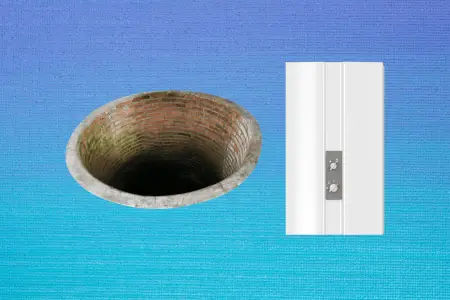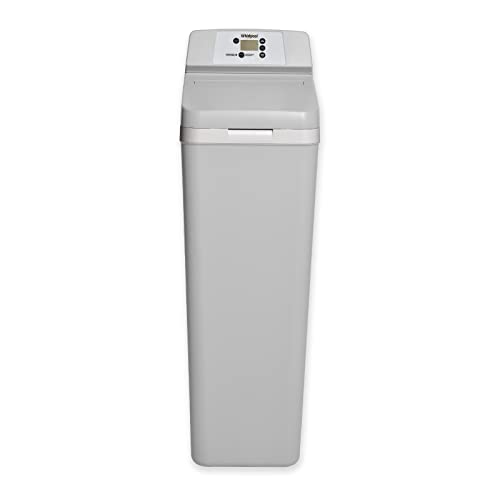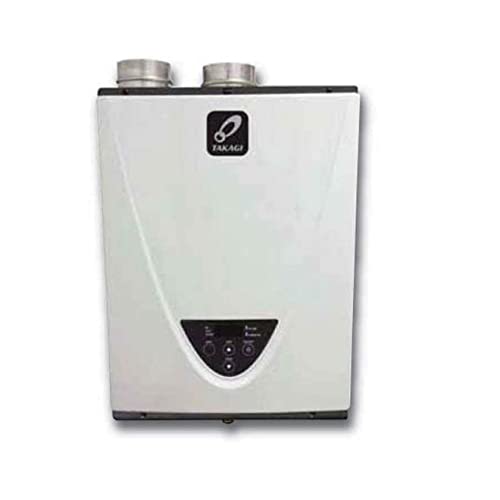You can use a tankless water heater with well water, but you will have to consider the temperature of the incoming water, the water pressure from the well, and whether your water is hard or has a lot of sediment.
In this article, I’ll go into more detail about what you need to do before a tankless water heater will work with your well water. I’ll also go over some of the best tankless options for well water.
Tankless Water Heater With Well Water
A tankless water heater doesn’t operate like a tank system, so in order to use it with a well, you will have to keep a few very important things in mind.
A tankless water heater is complex and has requirements in regards to pressure and temperature to operate properly. Many people think that since well water is colder than city water that tankless water heaters won’t work efficiently. But this is not true, as we’ll explain shortly.
In addition, your well water is not usually treated. If your well water is hard, it will require more maintenance to keep your tankless running at peak performance. And unlike a tank system that allows sediment to settle at the bottom of the tank, you will need to filter your water before it enters the tankless.
In essence, the three things that you need to deal with before you can install a tankless water heater with a well are:
- The water pressure coming from the well
- The quality of the water, i.e whether it is hard or has lots of sediment
- The temperature of the incoming water
Once you have these things dealt with then a tankless water heater will work out just fine.
Let’s go into all the details of each.
Tankless Water Heaters and Pressure
Just about every well owner has a pressure tank. This is essential to maintain a certain pressure so your fixtures don’t have water coming out irregularly.
Imagine taking a shower that alternatively sputters water on you and then shoots it like a jet.
This is not only inconvenient, but it will also keep your tankless water heater from working properly.
The computer needs to register a constant flow of a certain pressure to work properly. If your pressure is too low, then it won’t even fire up so you won’t have any hot water at all. (Source)
Even when the pressure is workable, if it fluctuates then you will have a fluctuating temperature of the water. Without a steady pressure, the heat exchanger won’t be able to properly heat the water as it rushes through. You’ll be hot and cold all throughout the shower.
That water pressure tank needs to be working well and maintained for your tankless water heater to work.
Required Pressure for Wells
The required water pressure is going to be different for each model so make sure you check what your water pressure is from the pressure tank and what the model you are looking at requires.
Generally speaking, a typical well pump will give you a low of 30 to 40 psi and a high of 50 to 60 psi.
You may be tempted to check your water pressure by using a gauge on the valve on the top of the tank. This may not actually indicate the pressure because it doesn’t check the pressure above the diaphragm.
With newer tanks, this is rarely an issue but older tanks with corroded rubber diaphragms will definitely need to be checked by a professional.
If you have an old pressure tank and are thinking of installing a tankless water heater then this is a good time to think about upgrading your tank.
You may even need to buy a water pressure regulator to make sure the pressure is as steady as possible.
- Helps Stop Water Pressure Damage: Helps stop damage to your RV/marine...
- Adjustable Water Pressure: An adjustment screw in the cap allows you to...
- Durable Construction: Constructed of durable CSA certified lead-free brass;...
- Low Lead Certified: Compliant with all federal and state level low lead...
- Note: 45-psi factory preset; Settings above 60-psi are not recommended
Dealing with Hard Water
Many of you will be dealing with hard water when it comes to using a well. And with hard water comes problems for your tankless water heater. You can use a tankless water heater no matter how hard your water is, but you’ll need to make sure you are doing a flush once per year to keep it running at its peak and prolong its life.
This really isn’t as bad as it sounds. It only takes an hour or so of your time and can be done yourself.
To make your life easier, I recommend going with a tankless water heater that has isolation valves. This is basically a bypass from the water supply so you can flush the heater without shutting your water down for the whole house.
Some tankless water heaters come with them already and some need to be bought separately.
The other alternative is to use a water softener. This can either be a filter that sits just before the tankless so the water gets softened before it enters, or you can get one that covers the whole house.
- Whirlpool WHES30 is ideal for households of 1-4+ people and removes up to...
- NSF certified to reduce hard water symptoms such as embarrassing stains,...
- Whirlpool water softeners automatically calculate how much salt and water...
- Full 1-year parts and labor warranty. The system warranty can be extended...
- Designed, engineered and assembled in the USA
With one of these, you never have to worry about hard water affecting your tankless and will ensure all of your appliances last longer.
Get a Sediment Filter for your Well
Having a filter that will remove any sediment from your well water is crucial. A tank system can let the sediment fall to the bottom of the tank and it will keep running. This is not the case with a tankless.
There is literally no place for the sediment to go so it clogs the heat exchanger. This can not only impact the lifespan of your tankless, but it may even prevent it from working at all.
Remember that the inside of your tankless is quite complicated and needs to be free of debris and scale build-up to keep working.
This iSpring WSP-50 filter can be had for sediment from 50 microns with options to go up to 1,000 microns in size.
Depending on what kind and how much sediment you are pumping into your house, you can filter it out easily with one of those.
Check It Out!
It is a good idea to have a filter when you have a tankless water heater. Water softeners and pre sediment filters will keep your on demand tankless running smoothly. You can read all about which kind of tankless water filters here.
Tankless Water Heater Size and Water Temperature
A common concern with well water is that since the temperature is too cold, it won’t work well with a tankless water heater. While this is a valid concern, it is easily solvable by simply having a properly sized water heater.
Knowing what size tankless water heater you need is essential no matter what the circumstances. When you are dealing with well water it is even more vital.
I wrote an article with everything you need to know about how to determine the tankless water heater size you need including a calculator to do the math for you.
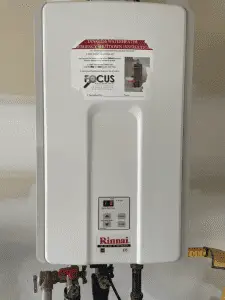
I’ll give you the quick version of why it is important.
You will see the GPM or Gallons Per Minute listed for each model. Remember, you are not dealing with a tank so your only concern is how many gallons of water flow you need at any one time. If you are running 4 showers per day your GPM is going to be very low unless you are running them simultaneously.
The temperature of the incoming water plays the biggest part of how many GPM you’re going to get. The lower the water temperature coming in, the less GPM you will get.
That 10 GPM your tankless says it gets is usually when the incoming water is warm, around 70°F or so. If your water is coming in at 40°F then you’re going to see a dramatic drop off with GPM.
The solution to this? Go with a higher GPM tankless water heater if you are using well water.
Best Tankless Water Heater for Well Water
When you are dealing with potentially cold well water coming in then I highly recommend getting a gas tankless water heater.
Electric ones don’t offer up the same GPM as a gas since it takes more energy to heat the exchanger.
If you do decide you want an electric, maybe because you don’t have access to gas or propane, then you should think about getting a few point of use ones and place one directly at the fixture where you need them. You can read my article with reviews of the best ones by clicking here.
The reason I suggest gas or propane is to get the highest GPM you can get. The tankless that gets the highest GPM is the Takagi T-H3-DV-N Condensing.
- Endless hot water, On-demand usage, Compact, Space saving, Energy...
- Computerized safety features, No pilot light to have to worry about
- Safety features include freeze, overheat, surge protection, and...
- Satisfies the 2012 SCAQMD Rule 1146.2 for Ultra-Low NOx Emissions
- Primary heat exchanger utilizes commercial-grade copper alloy for 25 times...
It is a condensing unit so it is highly efficient and will work as a whole house water heater even in cold climates.
Take a look at my list of the best gas tankless water heaters to see if there is one there that better fits your needs. Just remember to look for the highest GPM you can get and you should be covered.
FAQ Tankless Water Heaters and Well Water
Will well water heat up fast enough?
There are several variables that will determine how fast your well water will heat up. The most obvious reason is problem that your water heater is too small for your hot water needs.
Well water is typically dug below the frost line, so if you are getting cold water it is probably a piping issue. Wellhead insulation will help keep your pipes warm and ensure a stead flow of hot water from your well even in the coldest of winters.
How much does getting a well system cost?
Residential well drill costs are about $15 to $25 per foot of depth, so it is not exactly cheap. While there isn’t a “one size fits all” depth a well should be, expect at least 100 to 150 feet. Which means you should conservatively budget about $5,000 for the entire project.
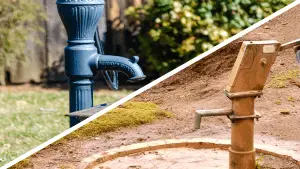
Final Thoughts
If you have been hesitant to go for a tankless water heater with a well, then I hope this article has opened your eyes to the possibilities. You can enjoy endless hot water with a well, whether the water is cold or hard.
You just need to plan ahead a little bit and make sure you have everything in place to get the most out of it.

Nick Lopresti is the founder of YourH2Home and a home improvement expert. He has years of experience writing about various home improvement topics, mostly as it pertains to water systems.
